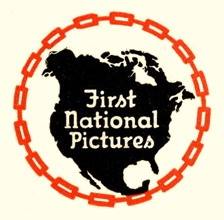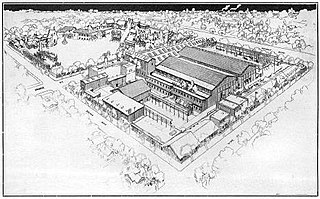Related Research Articles
The Fox Film Corporation was an American Independent film production studio formed by William Fox in 1915, by combining his earlier Greater New York Film Rental Company and Box Office Attractions Film Company.

First National Pictures was an American motion picture production and distribution company. It was founded in 1917 as First National Exhibitors' Circuit, Inc., an association of independent theatre owners in the United States, and became the country's largest theater chain. Expanding from exhibiting movies to distributing them, the company reincorporated in 1919 as Associated First National Theatres, Inc., and Associated First National Pictures, Inc. In 1924 it expanded to become a motion picture production company as First National Pictures, Inc., and became an important studio in the film industry. In September 1928, control of First National passed to Warner Bros., into which it was completely absorbed on November 4, 1929. A number of Warner Bros. films were thereafter branded First National Pictures until July 1936, when First National Pictures, Inc., was dissolved.

Paramount Pictures Corporation is an American film and television production and distribution company and the main namesake division of Paramount Global. It is the fifth oldest film studio in the world, the second oldest film studio in the United States, and the sole member of the "Big Five" film studios located within the city limits of Los Angeles.

Adolph Zukor was a Hungarian-American film producer best known as one of the three founders of Paramount Pictures. He produced one of America's first feature-length films, The Prisoner of Zenda, in 1913.

United Artists Corporation (UA), currently doing business as United Artists Digital Studios, is an American digital production company. Founded in 1919 by D. W. Griffith, Charlie Chaplin, Mary Pickford, and Douglas Fairbanks, the studio was premised on allowing actors to control their own interests, rather than being dependent upon commercial studios. UA was repeatedly bought, sold, and restructured over the ensuing century. Metro-Goldwyn-Mayer acquired the studio in 1981 for a reported $350 million.
Nicholas M. Schenck was a Russian-American film studio executive and businessman.
Major film studios are production and distribution companies that release a substantial number of films annually and consistently command a significant share of box office revenue in a given market. In the American and international markets, the major film studios, often known simply as the majors or the Big Five studios, are commonly regarded as the five diversified media conglomerates whose various film production and distribution subsidiaries collectively command approximately 80 to 85% of U.S. box office revenue. The term may also be applied more specifically to the primary motion picture business subsidiary of each respective conglomerate.

Loews Cineplex Entertainment, also known as Loews Incorporated, founded on June 23, 1904 by Marcus Loew, was the oldest theater chain operating in North America. From 1924 until 1959, it was also the parent company of Metro-Goldwyn-Mayer Studios (MGM).

Cineplex Odeon Corporation was one of North America's largest movie theatre operators and live theatre, with theatres in its home country of Canada and the United States. The Cineplex Odeon brand is still being used by Cineplex Entertainment at some theatres that were once owned by the Cineplex Odeon Corporation, with newer theatres using the Cineplex Cinemas brand. The company was the result of Cineplex Corporation purchasing and merging with Canadian Odeon Theatres, which was the result of a merger between Canadian Theatres and Odeon Theatres of Canada in 1978, in 1984.

William Fox was a Hungarian-American film executive who founded the Fox Film Corporation in 1915 and the Fox West Coast Theatres chain in the 1920s. Although he lost control of his movie businesses in 1930, his name was used by 20th Century Fox and continues to be used in the trademarks of the present-day Fox Corporation, including the Fox Broadcasting Company, Fox News, Fox Sports and Foxtel.

Twentieth Century Pictures, Inc., was an independent Hollywood motion picture production company created in 1933 by Joseph Schenck and Darryl F. Zanuck from Warner Bros. Financial backing came from Schenck's younger brother Nicholas Schenck, president of Loew's, the theater chain that owned Metro-Goldwyn-Mayer (MGM), Louis B. Mayer of MGM, who wanted a position for his son-in-law, William Goetz, Bank of America and Herbert J. Yates owner of the film processing laboratory Consolidated Film Industries, who later founded Republic Pictures Corporation in 1935. . The company product was distributed by United Artists (UA), and leased space at Samuel Goldwyn Studios.

Marcus Loew was an American business magnate and a pioneer of the motion picture industry who formed Loew's Theatres and the Metro-Goldwyn-Mayer film studio (MGM).

Cineplex Inc. is a Canadian movie theatre and family entertainment centre chain headquartered in Toronto.

The Loew's Wonder Theatres were movie palaces of the Loew's Theatres chain in and near New York City. These five lavishly designed theaters were built by Loew's to establish its preeminence in film exhibition in the metropolitan New York City area and to serve as the chain's flagship venues, each in its own area. All five theaters are still standing. One operates as a community performing arts center; one is a commercial live entertainment venue; and three are currently used as churches, with one of those also used for entertainment.
A studio system is a method of filmmaking wherein the production and distribution of films is dominated by a small number of large movie studios. It is most often used in reference to Hollywood motion picture studios during the Golden Age of Hollywood from the 1920s to 1960s, wherein studios produced films primarily on their own filmmaking lots with creative personnel under often long-term contract, and dominated exhibition through vertical integration, i.e., the ownership or effective control of distributors and exhibition, guaranteeing additional sales of films through manipulative booking techniques such as block booking.

Famous Players-Lasky Corporation was an American motion picture and distribution company formed on June 28, 1916 from the merger of Adolph Zukor's Famous Players Film Company—originally formed by Zukor as Famous Players in Famous Plays—and the Jesse L. Lasky Feature Play Company.
The Frohman brothers were American theatre owners, including on Broadway, and theatrical producers who also owned and operated motion picture production companies.

Block booking is a system of selling multiple films to a theater as a unit. Block booking was the prevailing practice among Hollywood's major studios from the turn of the 1930s until it was outlawed by the U.S. Supreme Court's decision in United States v. Paramount Pictures, Inc. (1948). Under block booking, "independent ('unaffiliated') theater owners were forced to take large numbers of [a] studio's pictures sight unseen. Those studios could then parcel out second-rate product along with A-class features and star vehicles, which made both production and distribution operations more economical." The element of the system involving the purchase of unseen pictures is known as blind bidding.

Richard A. Rowland was an American studio executive and film producer.
Stephen Andrew Lynch, known more commonly as S.A. Lynch, was an early motion picture industry pioneer.